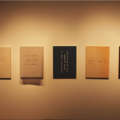Loving Kristeva: a Memoir

Media images of Philipe Sollers have portrayed him as a womanizer, and the multiple self-images he has created in his writing since the 1983 novel Femmes confirmed casual readers of his fiction in that opinion. With Portraits of Women, Sollers handily redresses this self-portrait. In this non-fiction work of twenty-two short essays, published in 2013, Sollers discusses gender issues and acknowledges his enormous debt to the women in his life.
In an uplifting, celebratory manner, this notoriously woman-oriented novelist addresses the relations between the sexes as concerns real women, the conditions that affect a woman’s independence and freedom, and the roles both sexes are made to play in current society—of which Sollers has long been a curmudgeonly critic.
As is typical of this author, he portrays himself as an exception to the common fate—the malaise that affects both men and women—and celebrates the exceptional women who match him in their exemption from a woman’s condition. This portrait of Julia Kristeva is one of three particularly significant ones along with those of his life-long mistress and the older woman who initiated him into sexual relations when he was fifteen, in addition to female relatives and famous women like Cleopatra and Charlotte Corday.
—Armine Kotin Mortimer, translator
A body appears with its past (one has to learn one’s past like a foreign language), but also sometimes with its future, hence the “thunderstruck” aspect of love. In this certain but unpredictable future, you are present. You were present one day, someone comes along, you have embarked on a journey of which you know neither the destination nor the stopovers. The only certainty: it’s a long-distance trip, like the great navigations of the past.
Julia is twenty-five, I’ve just turned thirty. She arrives from Sofia, Bulgaria, on a student fellowship. She is very beautiful (photo): dark hair, black eyes, melodious voice, perfect French. She comes to ask me about the avant-garde movements in literature, in the little office of the journal Tel Quel. I am expecting minimal knowledge on her part, a polite and mechanical attention (academe), but it’s nothing like that. From the start she quotes the surrealists, asks me what I think of the Russian formalists and the Futurists. Not a word about “communism” or the social responsibility of the writer. Although there is one: language. One cannot transform society unless one transforms its language. A pious wish, perfectly idealistic, since society has no other function than to mis-recognize the way it speaks (the proof: today).
Literature and art as the only sites of freedom with respect to society, especially after the totalitarian disasters? Granted, granted. But this needs deeper study. I invite her to dinner, we go to La Coupole, the conversation continues—we haven’t separated since.
It is impossible for her to return to her country of origin; her father is a suspect orthodox believer. She would have liked to study astrophysics, but literature won out. She is able to come to France thanks to the politics of de Gaulle, who has moreover just recognized China, via Malraux. The iron curtain is still there, the Berlin Wall is also; these things will never end, even if the cracks in the Empire are coming. I always astonish people when I say that my youthful “Maoism” was one consequence of Gaullist politics. It’s nevertheless true, the principal enemy having been the ex-USSR, and the United States before its Asiatic rout, followed by the erasure of the Kennedy dream.
So, what to do? We live like students. Julia gets sick, I am obliged to move heaven and earth to get her into a room at the Cochin hospital (her passport is communist), she can no longer rent a room in a house (oh, the one on the quai Louis-Blériot!), we have to act fast. Because she has been noticed for her knowledge and her intelligence (various seminars, including the one by Barthes, who will write a beautiful essay about her, “The Stranger”), she is offered positions in American universities. Oh no, come on: make it France. And if that means war with the French, it’ll be war.
We get married, discreetly, in the registry office of the fifth arrondissement. Two witnesses and her sister, who has come to Paris from the Moscow Conservatory (she is a violinist). No wedding rings, barely suppressed giggles during the mayor’s speech, no photos. We go have lunch at La Bûcherie, one of our meeting places, next to the Shakespeare & Co. bookstore, and there—surrealistic “objective chance”—we find Aragon in private conversation with Elsa Triolet. After he praised me to the skies for my first book, I saw Aragon several times, or rather I attended his interminable emphatic readings of his poems at his house. I have no sympathy for Elsa Triolet, who once came into Aragon’s office to bring me one of her books with the following dedication: “For Philippe Sollers, maternally.” Maternally! Damn!
Aragon has no idea about the young woman with me, who has been my wife for several minutes. The religious-communist cult for the Aragon-Elsa couple was such that the equation young French writer + woman from the East could only be initiated and recomposed on that model. So we have heard that tune a hundred times, either as a proposition of appropriation (communist) or as a condemnation (bourgeois). No, no, whatever you may think, it is not at all the same story. We are living another life, another novel.
Thus we have loved each other, Julia and I, in Paris, Saint Sebastian, New York, Beijing, Shanghai, Washington, London, and especially at my house on the Ile de Ré, of which she has become the queen, embellishing it. Oh, that burning hot summer of 1967! They’re bizarre, that young married couple! They do nothing but swim, play tennis, read, write, make love, sleep. What are they reading, even on the beach? Philosophers (especially Nietzsche) and—a splendid discovery—the huge encyclopedic books of Joseph Needham, Science and Civilization in China. China? Oh yes, China. Julia is getting a degree in Chinese, I’ll learn a bit of it for two years, the better to understand Laozi, Zhuangzi. There’s a strange guy over there, Mao, who has just staged an astonishing swim, followed by thousands of red flags in the Yangtze. A great criminal? No doubt, no doubt—but since the Russians and the Americans are not happy, let’s wait and see.
We get up early. Julia works hard, I have never seen anyone work so much. She speaks English and Russian fluently, is very strong in Greek and Latin, almost no accent in French, just a touch of charm. She is funny, passionate, indefatigable, our discussions continue even now, and, as she is still just as beautiful, it is the music of thought among flowers. She is able to gain recognition in linguistics with major innovations, astonish Jakobson, Lévi-Strauss, Benveniste, Barthes, Lacan, become a well-known psychoanalyst and an international academic. She is now a star in England, the United States, Japan, Norway (the Holberg Prize, the equivalent of the Nobel in the human sciences). Only the French, it’s logical, decide most of the time to ignore her in the tiresome recurring lists of awards for “intellectuals.”
This Byzantine aggravates and unnerves the Hexagonals. They are jealous, and besides, how can she tolerate a husband as unpredictable as he is uncontrollable? This Sollers has betrayed not only his class but also his country in not marrying a French woman. He will pay dearly for it, he was a good catch. All of Julia’s books count, but one of them touches me particularly, a volume of vulgarization very delightfully done, Le Langage, cet inconnu (Language: The Unknown), signed Julia Joyaux, republished later in paperback under the name Julia Kristeva. She is called sometimes Julia Kristeva, sometimes Julia Joyaux, Madame Joyaux, wife of Philippe Joyaux, himself known as Philippe Sollers. There is no “Julia Sollers,” as we had to remind Lacan one day, surprised to have made that mistake.
From time to time an American student rings the bell at my studio and asks, distantly and mistrustingly, if I am “Monsieur Kristeva.” When I am living with Julia in New York, I am indeed “Monsieur Kristeva,” which doesn’t bother me, on the contrary. I take advantage of my incognito as an unknown French writer, my literature being “too French” and absolutely censured by the puritanical American university. No point in explaining this, and besides, Julia’s different apartments are very pleasant.
Julia has fun: she writes a very good novel about our restless youth, The Samurai, a brilliant detective novel, Murder in Byzantium, a grand theatrical and lyrical biography of Saint Teresa of Avila, and, on the serious side, three studies of female genius, Hannah Arendt, Melanie Klein, Colette. Her finest book is no doubt Proust and the Sense of Time. The most audacious: Revolution in Poetic Language (Lautréamont, Mallarmé). Céline appears in Powers of Horror, and Black Sun: Depression and Melancholia is a model of clinical analysis. All these volumes are translated nearly everywhere, and recently (I salute the times!) into Chinese.
In her courses and lectures, in French or English, Julia is clear, documented, passionate. Her students adore her, her male and female patients respect her, whereas the psychoanalytic and academic clerisy hold a huge grudge against me. Naturally the suitors, sometimes very well known, have been numerous. How strange, though. I’ve forgotten their names.
Love lasts for three years, they say, or even less, and you can confirm that when it isn’t love. In reality, love lasts forever, you simply have to better define this forever. In one way or another, visibly or invisibly, you sanctify someone’s entire existence, her respiration and her death. Love, when it occurs, is stronger than death. In love, no matter what happens, even if it borders on horror or madness, you reach out and touch the defeat of death.
Julia pregnant was the garden itself and all the birds at once. I played some Haydn for her, the cellular musician of fibers. Our son David likes Haydn and Mozart a lot (he knows the life of Mozart by heart, and the ringer on his cell phone is the beginning of the Symphony no. 40 in G minor). He had serious health problems, and here too, it was a surprise to see Julia expend all her strength for his survival and to ameliorate his life. Women and children, huge chapter. What’s a man’s role in this dimension? I’ve got it: punctuation.
David: a courageous, strong, fragile, ultra-sensitive child. He knows that at heart I am like him: very fragile. He never bothers me, and when from time to time I have the right to a “my charming papa,” everything’s fine. What terrors we lived through because of him, especially Julia, in the hospitals he was taken to day or night. I have kept a gift he gave me, because I smoke too much: a box of Ricola, “Sugarless cassis with sweeteners, beneficial, calming, refreshing, candies made from plants, mixture of thirteen herbs from the Swiss mountains, gift of nature.” A fair trade for the dozens or hundreds of planes or little cars that I have given him here and there, not to mention the electric trains and then, as time passed, more and more advanced computers (I don’t know how to use them) and cell phones (never enough).
But that’s not the most important. He can unfailingly recite four or five fables by La Fontaine, non-stop Baudelaire, or El Desdichado by Nerval (“the prince of Aquitaine in his abolished tower”), in short, the heart of his native language:
I like games, love, books, music,
The city and country, in fact everything, there is nothing
That isn’t of powerful goodness to me,
Even the somber pleasure of a melancholy heart.
La Fontaine insists heavily on the relation between “nothing” and “everything” (“Let each other be as everything to you, hold the rest for naught”). The double negation in “There is nothing that isn’t of powerful goodness to me” is a fabulous invention, taken up by Voltaire in “The Terrestrial Paradise is where I am.” This vision of the world is on its way to becoming more and more forbidden.
David appears with the name Jeff in The Secret (his mother Julia is called Judith in the same book). A song for him, as a child: Le Temps des cerises (The Time of the Cherries). Yes, this revolutionary time will return, just as the gay nightingales, the mocking blackbird and the beauties with their follies in mind will also return, without end. I whistle quite well. David says to me: “Talk to the birds!” The funniest thing is that I do manage to do it. Even his mother, nonbeliever and notorious atheist, is forced to admit it for one minute, no more.
I have always been an apologist for marriage—mine, in any case, not other people’s. Marriage has exploded, divorces are through the roof, recomposed families struggle, but now marriage is back as protection and demand for stability. Young people, it seems, return to it out of conformism, homosexuals demand it and obtain it, along with the possibility of adopting children. In a context of devastation, this re-normalization is strange. Out of the ruins of traditional patriarchy we are headed towards a controllable matriarchy. Classic marriage oppressed women, the new marriage, in the West at least, is called upon to define men. They will be faithful, transparent, loyal, monogamous, participating, useful. The Rights of Man are made for that.
In any case, marriage for me was a defensive, anti-society decision. You love someone, society is opposed, you reaffirm your choice. A matter of time, in the times. If the “marriage of love” exists, it is threatened (if it is really a matter of love). You must therefore protect it with its particular components: immediate attraction, confidence, parallel work, each his and her place and money and name. That’s a strength. Where you get cornered is in the demand for transparency. On this point, nothing could be more false than the Sartre-Beauvoir contract: they say everything to each other, they tell all, they do nothing without the other’s watching and judging. Mistake, misrecognition of bodies. Women have suffered from it for centuries (convent, courtly love, Bovaryzation, adultery, various remarriages), and men, for the most part, have everything to lose: routine, censure, proprietary surveillance, banal castration. Let’s not go so far as to ask a woman to exclaim, like the heroic woman in Morand: “A man who does not cheat on his wife is not a man!”—but listen to what is being said there.
This: no possible discussion between men and women about “sexuality.” Opacity, general observations, but mostly silence. Make your own arrangements, the law has nothing to do with this business. You have the right to shelter your singularity in marriage, not the right to introduce the police into your intimacy, except for ill treatment. In general, marriage has been hell for the great majority. There was a time when Julia and I wanted to write a book in both our voices with the title: Marriage Considered as a Fine Art. But why offer ourselves as models? Only the title was good. As for the rest, except in fiction, discretion is advised.
Essay translator Armine Kotin Mortimer is also the translator of Philippe Sollers’s Mysterious Mozart (Illinois, 2010) and his Casanova the Irresistible (Illinois, 2016). Her translated excerpts from Sollers’s novels have appeared or are forthcoming in 3:AM Magazine, The Brooklyn Rail, The Cossack Review, Asymptote, Literature of the Black Sun, and AGNI. She has completed several other translations of novels by contemporary French writers for which she is currently seeking publishers. Her long career as a professor of French literature included many scholarly books and articles, as well as recognition by the French government with the Palmes Académiques honor in 2009.
About Phillipe Sollers
Phillipe Sollers, born near Bordeaux in 1936, founder of Tel Quel and L’Infini, powerful and influential editor, author of scores of novels, essays, and art criticism, “public intellectual” or media bad boy, has a lot to say about what society isn’t getting right. He is a versatile, controversial thinker. William Cloonan has stressed his importance for English speakers: “it would be severely limiting to attempt to follow developments in the cultural and artistic life of today’s France without a knowledge of the work of Philippe Sollers.” He lives in Paris with his wife, Julia Kristeva.





